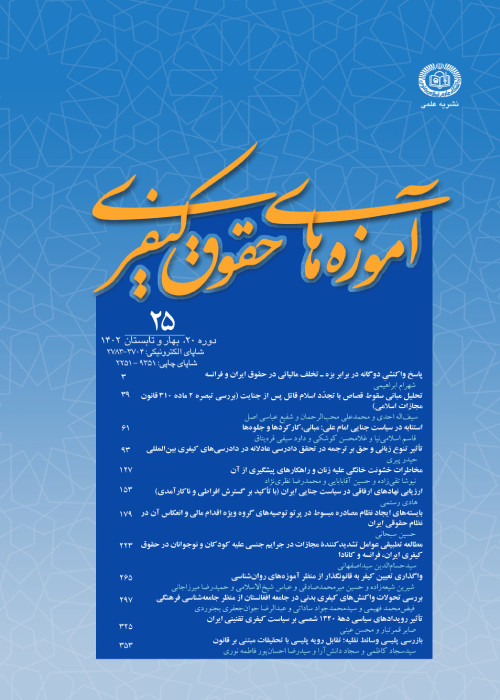Conditional Interpretation of Life Imprisonment in Compelling Conditions for Retribution: Nature and Consequences
Author(s):
Article Type:
Research/Original Article (دارای رتبه معتبر)
Abstract:
According to the popular view of Imami jurists, the punishment of “Mokreh” (duressing someone to commit a crime) is life imprisonment. However, there are disagreements regarding the nature of this punishment, whether it is limited or retaliatory, whether it is a right of individuals or a right of God, and accepting any of these theories has different legal and jurisprudential implications (such as reconciliation or transformation into another punishment, etc.). In Article 376, the legislator chose the theory of the right of individuals and conditioned life imprisonment on the presence of retribution conditions for the first time. Ambiguities in the article and its lack of legislative precedent have led to different interpretations and created various challenges in terms of interpretation and implementation. For example, in some cases, the deputy perpetrator of a crime goes beyond the direct perpetrator of the murder, or it is not clear whether equality conditions in retribution should be assessed between the victim and the compelling party or between the direct and indirect compelling parties, or considering the conditional nature of life imprisonment, does the request of the victim’s guardian nullify the punishment during the execution of life imprisonment, or does it, like theft with a specific limit, transform into a right of God, and the withdrawal of the victim’s guardian has no effect on its nullification? On the other hand, the relationship between Clause 6 of Article 19 and Article 375 is in a realm of ambiguity. This article, using a descriptive-analytical method and based on referring to jurisprudential and legal sources, seeks to analyze the nature of the punishment of “Mokreh”. The research results indicate that the conditions referred to in Article 376 are merely the evidentiary conditions for retribution (intentional compelling, equality in religion and intellect, and the absence of coercion), and in terms of nature, the theory of punitive life imprisonment in compelling someone to commit murder is more in line with the principles governing crimes and punishments, effective criminal policy, and the preservation of the rights of the victim’s family. Therefore, it can be said that with the approval of the supplementary Article 6 in 2020, life imprisonment for compelling someone to commit a crime has been transformed into first-degree imprisonment. Additionally, considering the exceptional nature of the provision in Article 376, a Muslim addict who commits murder under compulsion is not sentenced to life imprisonment; instead, according to the last paragraph of Article 376, the punishment of being an accomplice in murder is applied to them. In summary, the aforementioned ambiguities and challenges necessitate legislative amendments to prevent the violation of the rights of the accused and to preserve the credibility of judicial decisions by amending Article 37.
Keywords:
Language:
Persian
Published:
Criminal Law Doctrines, Volume:19 Issue: 24, 2023
Pages:
157 to 196
https://magiran.com/p2626996
دانلود و مطالعه متن این مقاله با یکی از روشهای زیر امکان پذیر است:
اشتراک شخصی
با عضویت و پرداخت آنلاین حق اشتراک یکساله به مبلغ 1,390,000ريال میتوانید 70 عنوان مطلب دانلود کنید!
اشتراک سازمانی
به کتابخانه دانشگاه یا محل کار خود پیشنهاد کنید تا اشتراک سازمانی این پایگاه را برای دسترسی نامحدود همه کاربران به متن مطالب تهیه نمایند!
توجه!
- حق عضویت دریافتی صرف حمایت از نشریات عضو و نگهداری، تکمیل و توسعه مگیران میشود.
- پرداخت حق اشتراک و دانلود مقالات اجازه بازنشر آن در سایر رسانههای چاپی و دیجیتال را به کاربر نمیدهد.
In order to view content subscription is required
Personal subscription
Subscribe magiran.com for 70 € euros via PayPal and download 70 articles during a year.
Organization subscription
Please contact us to subscribe your university or library for unlimited access!




